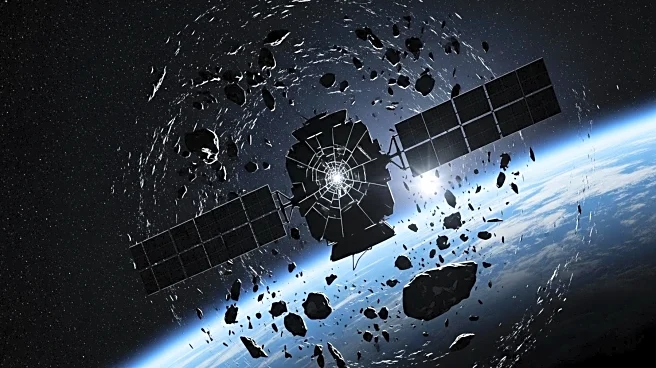What's Happening?
The frequency of space debris crashing to Earth is increasing, posing significant safety concerns. Astrophysicist Jonathan McDowell highlights that meteor-size space debris has been descending regularly for the past 60 years, often uncontrolled and untracked. Recently, a piece of Cosmos 482, a Soviet-era rocket, re-entered Earth's atmosphere after 50 years, potentially crashing near Indonesia. The Outer Space Treaty of 1967 and the Liability Convention of 1972 hold launching states accountable for damages caused by their space activities. However, there is no comprehensive framework to manage the growing number of objects in orbit, nor a formal system to coordinate space traffic. The U.S. Space Force can track space objects and notify operators of potential collisions, but lacks authority to enforce preventive measures.
Why It's Important?
The increasing risk of space debris crashes has significant implications for global safety and space governance. As near-space becomes more congested, the likelihood of catastrophic events grows, potentially endangering populated areas. The absence of a coordinated international framework to manage space traffic exacerbates these risks. The U.S. government's proposed budget cuts threaten the development of the Traffic Coordination System for Space, which could further hinder efforts to mitigate collision risks. This situation underscores the urgent need for international collaboration and regulation to ensure safe and sustainable space exploration.
What's Next?
The growing threat of space debris necessitates immediate action from international stakeholders. Countries and private companies must collaborate to establish a comprehensive framework for space traffic management. This includes developing protocols for tracking and mitigating debris risks, as well as enforcing accountability for damages. The U.S. Space Force's role in monitoring space objects could be expanded, but requires adequate funding and support. Additionally, the international community may need to revisit existing treaties to address the evolving challenges of space exploration and ensure long-term safety.
Beyond the Headlines
The issue of space debris raises ethical and legal questions about the responsibilities of space-faring nations and companies. As the space industry expands, the potential for environmental and societal impacts grows, necessitating a reevaluation of current policies. The development of sustainable practices in space exploration could become a focal point for future discussions, emphasizing the need for responsible stewardship of outer space.









